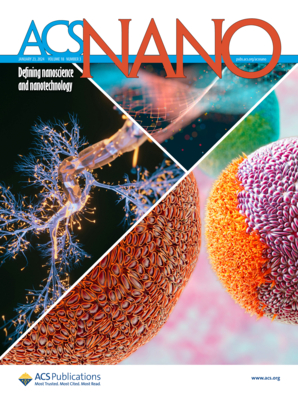热敏瑞昔喹莫特负载的脂质纳米颗粒促进肿瘤相关巨噬细胞的极化以增强膀胱癌的免疫治疗
IF 15.8
1区 材料科学
Q1 CHEMISTRY, MULTIDISCIPLINARY
引用次数: 0
摘要
膀胱癌是泌尿系统常见的恶性肿瘤,具有高发病率、复发率和死亡率。免疫检查点抑制剂的免疫治疗在膀胱癌中显示出良好的治疗效果和安全性。免疫检查点抑制剂也被批准作为一线和二线药物治疗局部晚期或转移性膀胱癌。然而,免疫疗法对癌症免疫治疗的反应和药物辅助较低,这可归因于抗原呈递不足、肿瘤免疫抑制细胞积累和肿瘤微环境中的T淋巴细胞耗竭。为了克服免疫治疗的缺点,我们制备了瑞喹莫特(R848)/光热剂(DTPA)负载脂质纳米粒(R848/DTPA@DSPE-PEG NP),该纳米粒具有良好的光热转化效率、生物安全性和生物相容性。激光(635 nm)照射R848/DTPA@DSPE-PEG NPs可损伤MB49细胞,诱导免疫原性细胞死亡,引发免疫应答。同时,R848/DTPA@DSPE-PEG NPs还能促进m1样巨噬细胞的极化和树突状细胞的体外成熟。此外,R848/DTPA@DSPE-PEG NPs经635 nm激光照射可抑制皮下和原位膀胱肿瘤生长,激活免疫反应,促进肿瘤中树突状细胞成熟和m1样巨噬细胞极化,增强CD8+ T淋巴细胞浸润,减少m2样巨噬细胞极化。生物信息学分析发现,R848/DTPA@DSPE-PEG NPs还能诱导免疫信号通路的免疫相关基因过表达。R848/DTPA@DSPE-PEG NPs联合PD-1抗体可显著增强抗肿瘤治疗效果,重编程肿瘤免疫抑制微环境,延长生存时间。本文章由计算机程序翻译,如有差异,请以英文原文为准。

Thermosensitive Resiquimod-Loaded Lipid Nanoparticles Promote the Polarization of Tumor-Associated Macrophages to Enhance Bladder Cancer Immunotherapy
Bladder cancer is a common malignant tumor of the urinary system and is associated with high morbidity, recurrence, and mortality rates. Immunotherapy with immune checkpoint inhibitors has shown great therapeutic outcomes and safety in bladder cancer. Immune checkpoint inhibitors have also been approved as first- and second-line drugs for the treatment of locally advanced or metastatic bladder cancer. However, immunotherapy has a low response and drug assistance for cancer immunotherapy, which can be ascribed to insufficient antigen presentation, tumor immunosuppressive cell accumulation, and T lymphocyte exhaustion in the tumor microenvironment. To overcome the disadvantages of immunotherapy, we prepared a resiquimod (R848)/photothermal agent (DTPA)-loaded lipid nanoparticle (R848/DTPA@DSPE-PEG NP), which has shown good photothermal conversion efficiency, biosafety, and biocompatibility. R848/DTPA@DSPE-PEG NPs with laser irradiation (635 nm) can damage MB49 cells and induce immunogenic cell death in vitro, which could trigger an immune response. Meanwhile, R848/DTPA@DSPE-PEG NPs can also promote M1-like macrophage polarization and dendritic cell maturation in vitro. Moreover, R848/DTPA@DSPE-PEG NPs with 635 nm laser irradiation can suppress subcutaneous and orthotopic bladder tumor growth and activate the immune response, which can promote dendritic cell maturation and M1-like macrophage polarization, enhance CD8+ T lymphocyte infiltration, and reduce M2-like macrophage polarization in tumors. Bioinformatics analysis found that R848/DTPA@DSPE-PEG NPs can also induce immune-related gene overexpression of immune signaling pathways. Combined R848/DTPA@DSPE-PEG NPs with PD-1 antibody can significantly enhance antitumor therapeutic effects, reprogram tumor immunosuppressive microenvironment, and prolong the survival time.
求助全文
通过发布文献求助,成功后即可免费获取论文全文。
去求助
来源期刊

ACS Nano
工程技术-材料科学:综合
CiteScore
26.00
自引率
4.10%
发文量
1627
审稿时长
1.7 months
期刊介绍:
ACS Nano, published monthly, serves as an international forum for comprehensive articles on nanoscience and nanotechnology research at the intersections of chemistry, biology, materials science, physics, and engineering. The journal fosters communication among scientists in these communities, facilitating collaboration, new research opportunities, and advancements through discoveries. ACS Nano covers synthesis, assembly, characterization, theory, and simulation of nanostructures, nanobiotechnology, nanofabrication, methods and tools for nanoscience and nanotechnology, and self- and directed-assembly. Alongside original research articles, it offers thorough reviews, perspectives on cutting-edge research, and discussions envisioning the future of nanoscience and nanotechnology.
 求助内容:
求助内容: 应助结果提醒方式:
应助结果提醒方式:


